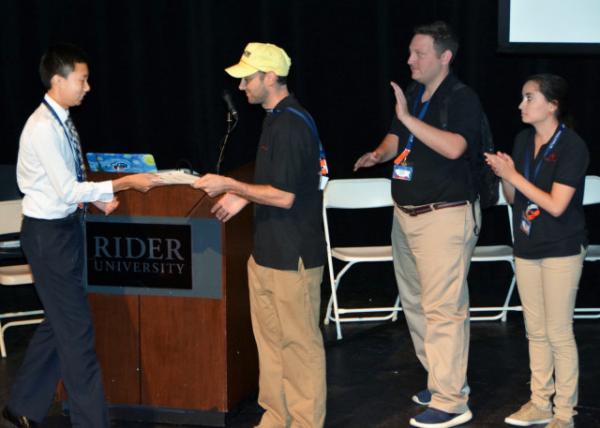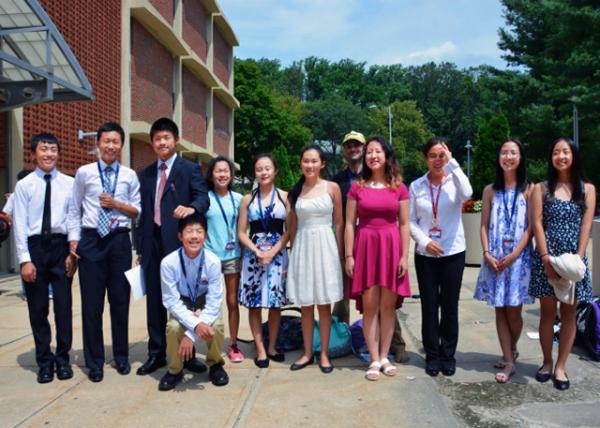2017-08-10
【Aiden in English】 Time for debate. The big-boy, try-hard pants are on, and yet I still feel as if everything was unprepared. Today marked the beginning of a great adventure, a long series of competitions and brutal tests against many opponents, all leading to the ultimate goal: a championship win. I was placed in the intermediate division due to my age and limited experience. However, my slight advantages over other students were the many lessons I’ve taken on public speaking. The gifted program and Guanghua Chinese school have taught me that speech comes naturally, and memorization is a typical way to mess up. Considering these things, I thought the debate was the perfect example of thinking on the spot and showcasing my impromptu talents. I should probably explain how the Capital Debate format worked. It was not in any traditional format, although it somewhat resembled the Lincoln-Douglas formats. The Capital Debate featured teams of two, with speakers one and two, who rotated different jobs. The Affirming side would construct its case first, having four minutes to do so. The second side, Negative, would cross-examine, similar to a questioning session. This time was set aside to poke holes in the opponents’ case, whether in the evidence, the reasoning, or setting a loophole in which any answer the opponents give would win you the argument. Following the first cross-examination, the Con side presents its opening statements, followed by another cross-examination from the Pro. Then, Con attacks the Pro’s contentions, using the information gained during cross-examination. Later, the Pro attacks, and each side cross-examines the opposition’s attack. They then defend the attacks and conclude with a summary explaining why their side won the argument, even if you believed they lost. Therefore, the debate suits me because I will not concede defeat even when a sliver of hope remains. I also don’t care for our case most of the time, and my strategy was that if the opposing case were torn apart during cross-examination and the attack speech, we would win. With this in mind, I always chose to go second, giving me an advantage in both attack and summary. I love the impromptu opportunities these speeches provide, allowing me to challenge the technicalities and evidence presented by the opponents. My partner, Lyle, was our opening speaker and defender. Before I delve into the debate, I would like to briefly explain the resolution or idea we are discussing. “The United States Government should fully fund Universal Health Care Coverage.” It sounds like an annoying research topic, but it makes attacks even more fun. I assume that everyone reading this has already conducted their research on UHCC (Universal Health Care Coverage) and that I don’t need to provide a lengthy explanation of UHCC, its definition, the differences between UHC and UHCC, and how UHC operates as a single-payer system. UHCC is unique and is not currently used anywhere in the world. Furthermore, the resolution contradicts itself in that the government fully funds healthcare. In contrast, UHCC clearly states that taxes from the people will fund the system, thereby eliminating the argument that the government will incur a loss. UHCC would also likely have a bracket tax system similar to ours. Instead of reviewing the lengthy list of evidence from hundreds of sites and dozens of blocks, I would like to discuss key points during the debate. Each debate featured essentially new arguments, and even if the same warrants were run, the evidence varied. Each opponent employed a distinct debate style, varying between appeals to pathos and logos. However, no single argument could remain unscathed, and it was my job to destroy their contentions. The regular season, or the “Tournament,” was about picking up as many wins as possible and receiving feedback from the judges. Most speakers note that some judges value speaking and pathos over statistics and logos. Therefore, the results may have varied from judge to judge. What I do know is that the overall theme remained the same for each side. The Con always tied in money, and the Pro always mentioned lives. During the attack, the opposing side would attempt to outweigh the other side’s values, proving that UHCC would make more money or save fewer lives. Then, the defense speech would be another argument over how the funds would outweigh lives or vice versa. This was essentially the layout for a debate. My partner and I crushed many opponents throughout the tournament to qualify for the playoffs, beating everyone convincingly. We ended with the best record for the entire division, 5-0. However, playoffs matter, and we severely choked, losing in the first semifinals. Oddly enough, the final two teams in the finals were both opponents we had faced in the tournament, and both were somehow defeated. Even if we didn’t win the championship, there is a moral victory deep within. I also felt that the arguments in the finals were simply too easily disrupted by attacks. But regardless of what I felt, the judge didn’t think we deserved to be in the finals. We fell short of our projected standards. However, during the awards ceremony, we not only received third place in the division, but I was also given the Best Speaker Award. I thought Lyle and I won the debate at certain times because we had better speakers, but I hope that’s not the case (pun). 【红霞译】
辩论的时刻到了,大小伙子们个个卯足了劲跃跃欲试,可我还是觉得什么都没准备好,今天标志着一系列辩论大比武的开始,一路过五关斩六将直至终极目标:冠军得主。
基于年龄和经验有限,我被分派到中级辩论区,这样反倒让我略占优势,毕竟以前上过很多演讲课,资优班和光华中文学校均教我谈吐自然,背稿只会横添乱子。牢记这些要领,我想辩论当该成为表现临场思考和展示本人即兴发挥才能的完美范例。
我也许应该先解释一下国会辩论营所采取的辩论模式,虽说有点遵循“1858年林肯—道格拉斯辩论”规范,但它与任何传统形式不尽相同。国会辩论团队由两人即第一位和第二位辩手组成,彼此轮流扮演不同角色。第一队即正方开篇陈述四分钟;第二队即反方交叉提问,与陈述部分相似,在限定时间来找出对方漏洞,无论在证据、推理或者从对方回答问题时出现的闪失都能帮你赢得这场辩论。
在第一次交叉提问之后,轮到反方开篇陈述,正方再交叉提问,然后反方答辩,每一方交叉质疑对方的攻辩,争执双方各自发表驳论,最后结辩解释自己为什么赢得争论,即使你相信大势已去。
我觉得自己适合辩论,因为哪怕获胜的可能性很小,我也会巧取制胜。多数情况下,我对本队接什么案例都不计较,假如其它案例在交叉质疑时被推翻,我加强攻辩策略,那么肯定胜券在握。
正因如此,我总爱出任第二辩手,接受进攻并总结陈词。我喜欢临场演讲时即兴表现,亲自指证对方技术性和证据上的缺陷,而我的同伴莱尔则做开篇立论和辩护人。
在我卷入辩论之前,我喜欢对结论或者即将辩论的构想点到为止。“美国政府应该全力资助全民健康保健”,乍听起来像是非常棘手很难研究透彻的课题,但它却使攻辩变得更有意思。假设凡是看到此篇文章的读者都曾研究过全民医疗保障,所以我在这里不必长篇累牍解释它代表什么及其具体定义、全民医疗保健和全民医疗保障之间的差异、全民医疗保健如何是单一支付人、全民医疗保障独一无二但迄今尚未在世界上任何地方推广使用。此外,对方在结辩政府全力资助健康保健上自相矛盾,因为全民医疗保障清楚地指出整个系统资金运营全部来自个人上缴的税收,所以应该排除政府亏损这一论据,全民医疗保障充其量牵扯到的只是税率制度问题,与我们现有的一样。
暂且不说那些从几百个网站几十条网讯上摘录下来乏味而冗长的证据,我想谈一下辩论积分。每场辩论原则上都要提出新论据,即使操作机制相同,可证据总有变化。随着场上情绪与理智的变化,争论双方辩风也各有差异。然而,没有任何单一论据能够毫发无损,我的工作就是要攻击对方论点。
常规赛季亦称“比赛”赢得越多积分越高,评委提供反馈意见,多数情况下辩手积分取决于评委如何衡量情绪表达与逻辑推理,所以说不同的评委打分迥然有别。
辩论双方无论谁做正方还是反方,我知道核心主题固定不变,反方总是跟金钱脱不了干系,正方则与生命线密切相关。进攻期间,反方试图凌驾于正方价值观之上,证明全民医疗保障实际上赚钱即丧失生命;接着正方摆出另一论点,到底金钱高于生命还是生命比金钱重要。从本质而言,辩论就是按照这种布局设计的。
通过常规赛季选出参加季后赛的辩手,我和同伴以绝对优势击败各个对手而入围,并且创下了整个赛区五局全胜大满贯纪录。诚然,季后赛才是最重要的,我俩在第一场半决赛上惨遭淘汰。令人抓狂的是,进入决赛的两个队都是我们在常规赛季中相遇的对手,当时他们输得惨不忍睹。我觉得即使咱没摘取冠军头衔,内心深处还是虽败犹荣,只是在决赛中论据经不起攻辩而已,但不管个人感觉如何,归根结底评委认为我们没有资格角逐冠军。
比赛结束了,我们并未达到预期目的,然而在颁奖仪式上,咱哥儿俩不仅获得团体第三名,我还捧回最佳辩手证书。有时候我在想,自己和莱尔之所以赢得辩论,当该归功于卓尔不群的演讲者,但我倒希望蛮不是那档子事儿(双关语)。 明天将是夏令营最后一天,人人都互道再见,我有点伤心,况且没人想要离开。说真的,现在手机盛行,我会一直通过网络与夏令营结识的其他辩手保持联系,但发短信永远没有辩论时唇枪舌战那种互动,朝夕相处的日子已经把素昧平生的我们变成了一见如故的老朋友。 Today in History(历史上的今天): 2015: GHCS Camp─Behavior(光华夏令营─规矩) 2014: Auld Lang Syne(友谊地久天长)
 Completion of the Capital Debate Camp Completion of the Capital Debate Camp
(国会辩论营辩论结束 08-11-2017)  Award Ceremony (颁奖 08-11-2017) Award Ceremony (颁奖 08-11-2017)
 Farewell (告别 08-11-2017) Farewell (告别 08-11-2017)
Crosslinks(相关博文):
2017: Capitol Debate Camp Day-6(国会辩论夏令营第六天) 2017: Capitol Debate Camp Day-5(国会辩论夏令营第五天) 2017: Capitol Debate Camp Day-4(国会辩论夏令营第四天)
2017: Capitol Debate Camp Day-3(国会辩论夏令营第三天)
2017: Capitol Debate Camp Day-2(国会辩论夏令营第二天)
2017: Capitol Debate Camp Day-1(国会辩论夏令营第一天) 8th Grade(初中三年级) |
